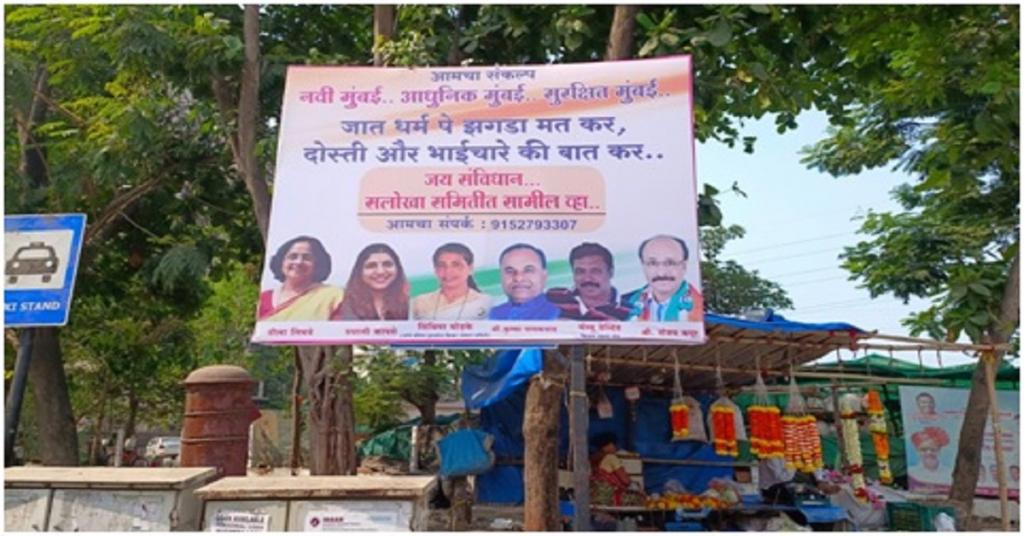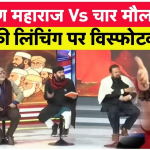
Everyday Harmony: Banners asserting fraternity & sisterhood plaster Navi Mumbai streets In a unique effort of citizens driving positive Counter Communication messages, women of and men assert themselves against the corrosive hate narrative
19, Apr 2023 | CJP Team
Power of Positive Words and Imagery. Thank You Neela Limaye, Rupali Kapse, Cynthia Ghodke, Srikrishna Gaikwad, Mathew David, Sanjay Kapoor for breathing a fresh ray of positive hope into our public spaces.
The streets of Navi Mumbai have now these 15 banners, reminding one and all of the everyday sisterhood, harmony and fraternity that pervades every walk of life. Navi Mumbai like so many hot spots in Maharashtra have over the past six months witnessed a targeted spiral of hate events and vitriol.
Amidst the systematic hate leading to growing anger and despair, it is important to showcase a lived reality of camaraderie, equality and sharing which is the bedrock of the Indian Constitution and secularism. That way we not only hold on to every thread of hope, but effectively project these narratives, lest we lose our will to fight the good fight. As part of our #EverydayHarmony series, CJP brings you instances where Indians share and care, every single day… our food, our businesses, our homes and our friendships. This instances show how we Indians continue to reject hateful and divisive agendas even while street violence and social media are used as part of a sinister, hate-filled political agenda to tell us otherwise. Let’s reinforce India’s everyday lived reality, and through that collectively and aggressively, uphold and defend a unique pluralism, a diverse culture and truly secular values. Donate now to help us combat hate and prejudice!
These banners are simple, and serve as an everyday reminder to the people to not create division along the religious lines, and talk about friendship and brotherhood. They remind us of our constitution, which has no space for division, no place for discrimination. Maharashtra has been on the target of the far-right political leaders, with rallies and processions being organised every other day, promoting their divisive ideology and raising demands of unified Hindu nation. These banners provide a relief from vitiated poison and remind us that there are people who do not believe in these separatist notions, and do not want to spread hatred.
Words have tremendous power. Nehru’s “Tryst with Destiny” is one of the most famous speeches ever delivered by an Indian Prime Minister, as India gained her Independence. It was delivered on the eve of India’s independence from British imperial rule on August 14, 1947. The speech marked a new chapter in India’s history, we became an independent nation after centuries of foreign rule. In his speech, Nehru had spoken about the long struggle for independence and the sacrifices made by the people of India to achieve this goal. He had also addressed the challenges and opportunities ahead for the newly independent nation. The speech was powerful and inspiring, and it helped to rally the people of India at a crucial moment in their history.
We’ve come a long way since then, and India has changed drastically. Since then, the words of extremist far-right leaders in India have had serious ramifications for the country’s social peace and harmony. It is critical to recognize that hate speeches do more than just incite violence; they also reinforce existing prejudices and entrench existing discrimination. The current dominant political climate in India perpetrates divisiveness and hatred. This despite the efforts by citizens groups, Citizens for Justice and Peace included, to make every effort to ensure that the demonizing hate speech and hate actions of repeat offenders warn authorities so that appropriate action can be taken. Saloka Samiti was formed as an umbrella organization of women and other civil rights organisations to launch a focused and cohesive programme against this hate mongering. Many groups are working to educate Indian citizens about the disinformation and mis-information spread by far right leaders, many of the Hindutva ilk, that provoke the wider population against the religious minority community. Another section is working to provide a counter narrative to this pervasive hatred, reminding people that our country has overcome every struggle and battle together and will continue to do so.
One way of asserting methods and means of counter-speech is to evolve different means and methods, slogans, plays, songs that quietly assert a counter narrative. To counteract hateful content, spread positive messages of tolerance, equality, and truth in defense of those who are facing the hate and otherisation. One component of the solution promoted by peacemakers has frequently focused on getting political and so-called moderate religious leaders to condemn extremist ideology; identifying “authentic” voices in local communities—typically women, youth, or other community leaders, or better yet, former extremists—”to help dissuade a young person from finding that ideology appealing.”
The politically shrill demands of hate mongers and their political counterparts for a nation built on hierarch uniformity, exclusivist of religions, races and genders is being fostered by a predominant privileged caste Hindu worldview. In sharp contrast, the Indian Constitution embodies a sense of nationhood and unity in diversity and fraternity, and not by forcing minorities to follow majoritarian principles, but by instilling a sense of shared belonging as well as reverence that transcends all other differences between people.
Dr Babasaheb Ambedkar’s clarity on the interconnection and non-negotiables of equality, liberty and fraternity remain a lesson for all. He famously said, “Equality without liberty would kill individual initiative. Without fraternity, liberty would produce the supremacy of the few over the many.” And of fraternity he was clear, “This is fraternity, which is only another name for democracy. Democracy is not merely a form of Government. It is primarily a mode of associated living, of conjoint communicated experience. It is essentially an attitude of respect and reverence towards fellowmen.”
Related:
To Lord Ram, a letter of remorse and resolve
All religions gather for peace march in Malad-Malwani in Mumbai
Mumbai: Police foils attempts to disturb peace in Mira Road









